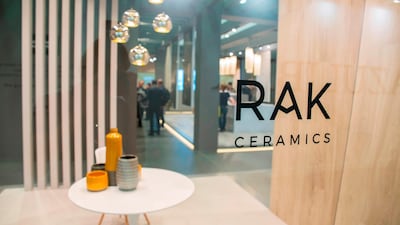RAK Ceramics is looking to expand its retail presence in a bid to replace some of the revenue lost from a slowdown in the market for new commercial projects.
The company, which manufactures tiles, sanitary ware and tableware, reported a 7.2 per cent year-on-year decline in second quarter revenue to Dh667.4 million, but managed to improve net profit by 37 per cent to Dh61.2m during the same period. For the six-month period, net profit dropped 11 per cent to Dh90.2m as revenue fell 7 per cent to Dh1.29 billion.
"Looking at the region – and also the whole world today – it is not an easy place to do business," RAK Ceramics chief executive, Abdallah Massaad, told The National. "You see liquidity is tight, government budgets are down, spending power is less, but we are happy or satisfied from the results we have."
Mr Massaad said that a rebranding exercise implemented last year, which was followed by the introduction of dedicated company showrooms, had paid off.
"In the UAE, our sales to projects is down [but] our sales in retail is up. So we mitigated by investing in our showrooms and our positioning."
The company is now extending this model to Saudi Arabia, where its first showroom opened on Al Kharj Road in Riyadh three months ago, and a second showroom in the city will open next month. Its first Jeddah showroom – at 2,800 square-metres – will open early next year.
"We are rolling out the marketing, the positioning and our rebranding in Saudi now," Mr Massaad said.
RAK Ceramics completed a buyout of its distribution partners in Saudi Arabia last year and is scouting potential sites for a manufacturing facility in the kingdom, which is currently served from its Ras Al Khaimah base.
He said Saudi Arabia is the biggest market in the region for ceramics, and there were advantages of having a base in the kingdom in terms of energy costs, availability of raw materials and proximity to the market.
Mr Massaad said the company could accommodate any increase in borrowing that may be required to build a new facility through its own cash flows, adding that it is generating "almost half a billion dirhams" a year in earnings before tax, depreciation and amortisation.
"We are paying dividends on a yearly basis, we are improving our capacity and in spite of this also we are reducing our net debt," he said. "The cash flow in the company supports the financing of any expansion we want to do."
The long-term outlook for the construction sector in Saudi Arabia is positive, but there are doubts as to when the industry will begin to reap the benefits of increased investment in the kingdom's non-oil economy.
In its recent Mena Market View report, UK construction consultancy Mace said work associated with the kingdom's Vision 2030 strategy would "drive industry growth over the coming years, but the speed at which the privatisation programme is delivered will influence the outlook".
"Investment in infrastructure, housing and facilities for tourists will underpin construction activity growth over the coming years," the report said.


